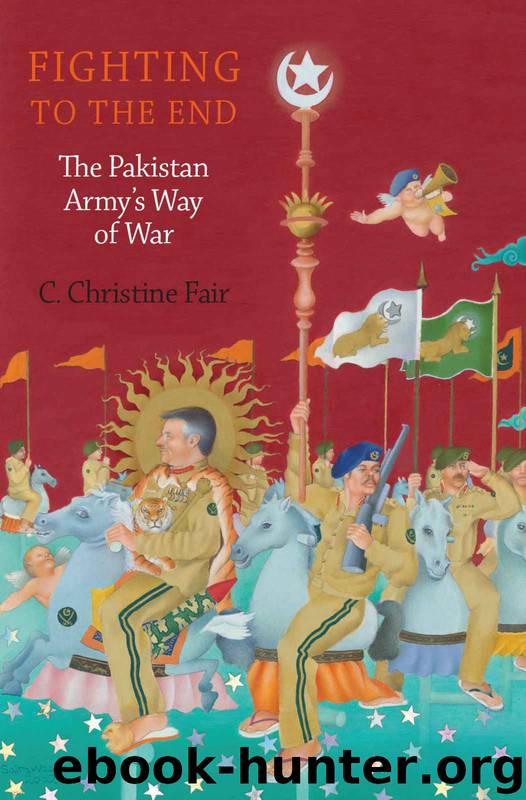Fighting to the End: The Pakistan Army's Way of War by Fair C. Christine

Author:Fair, C. Christine [Fair, C. Christine]
Language: eng
Format: epub
Publisher: Oxford University Press, USA
Published: 2014-04-02T00:00:00+00:00
Pursuing the Americans: An Alliance for Survival
Both American and Pakistani commentators agree that Pakistan, born during the Cold War, immediately leaned toward the West. In September 1947, Mohammad Ali Jinnah proclaimed during a cabinet meeting that “Pakistan [is] a democracy and communism [does] not flourish in the soil of Islam. It [is] clear therefore that our interests [lie] more with the two democratic countries, namely, the U.K. and the U.S.A., rather than with Russia” (Kux 2001, 20). (India, in contrast, pursued neutrality.) Academic accounts of the postwar period depict the United States as somewhat aloof toward South Asia and as struggling to define its regional interests and, concomitantly, its policies toward the region; the Harry S. Truman Administration was content to let the United Kingdom take the lead in South Asia. Both Britain and the United States sought to develop relationships with India and Pakistan simultaneously in hopes that the two states would formally or informally align with the West and oppose the Soviet Union. United States planners and their British counterparts tended to view India as the most important diplomatic prize and were wary of antagonizing its prickly leadership (Kux 2001; McMahon 1994; Pande 2011). Ultimately, however, with US attention concentrated upon Western Europe, the Middle East, and East Asia, senior US officials paid scant regard to either India or Pakistan in the initial years after their independence. The US Central Intelligence Agency (CIA) never mentioned India or Pakistan by name or even referenced the region generally in the 1947 and 1948 editions of its annual “Review of the World Situation as it Relates to the Security of the United States.”
Academic accounts of this period focus on Pakistan’s destitution, mounting refugee problems, eviscerated institutions, and critical human capital shortages. Within just two months of becoming a state, Jinnah “invited the United States to become the principal source of external support” for Pakistan and requested a $2 billion loan over five years (McMahon 1994, 69; see also Kux 2001; Pande 2011). As Jinnah envisioned it, these funds would be used to help Pakistan build up its armed forces and to jump-start various agricultural and industrial projects. While Pakistan’s leaders really sought assistance to underwrite its security vis-à-vis India, they were aware that America’s principal concern was the Soviet Union and thus couched all requests within strong anti-communist rhetoric.
The magnitude of Pakistan’s request revealed how disengaged Karachi (then the capital of Pakistan) was from the realities of American postwar interests. The amount of $2 billion was simply outlandish. By way of comparison, it is useful to recall that the entire US Marshall plan, which was a four-year effort to rebuild war-torn Europe beginning in April 1948, totaled about $13 billion (George F. Marshall Foundation n.d.). The Defense Department budget for 1949 was $14 billion (US Bureau of the Census 1950). Not only was the amount absurd in absolute terms, but it was even more so given that the United States had virtually no interest in South Asia whatsoever when Pakistan made the appeal.
Download
This site does not store any files on its server. We only index and link to content provided by other sites. Please contact the content providers to delete copyright contents if any and email us, we'll remove relevant links or contents immediately.
The Secret History by Donna Tartt(19045)
The Social Justice Warrior Handbook by Lisa De Pasquale(12185)
Thirteen Reasons Why by Jay Asher(8889)
This Is How You Lose Her by Junot Diaz(6875)
Weapons of Math Destruction by Cathy O'Neil(6263)
Zero to One by Peter Thiel(5786)
Beartown by Fredrik Backman(5737)
The Myth of the Strong Leader by Archie Brown(5496)
The Fire Next Time by James Baldwin(5429)
How Democracies Die by Steven Levitsky & Daniel Ziblatt(5211)
Promise Me, Dad by Joe Biden(5141)
Stone's Rules by Roger Stone(5080)
A Higher Loyalty: Truth, Lies, and Leadership by James Comey(4948)
100 Deadly Skills by Clint Emerson(4919)
Rise and Kill First by Ronen Bergman(4777)
Secrecy World by Jake Bernstein(4740)
The David Icke Guide to the Global Conspiracy (and how to end it) by David Icke(4699)
The Farm by Tom Rob Smith(4502)
The Doomsday Machine by Daniel Ellsberg(4484)
